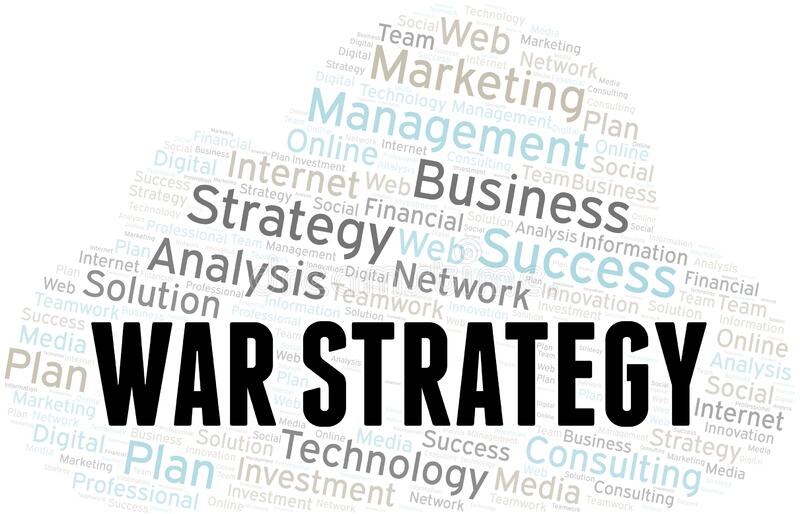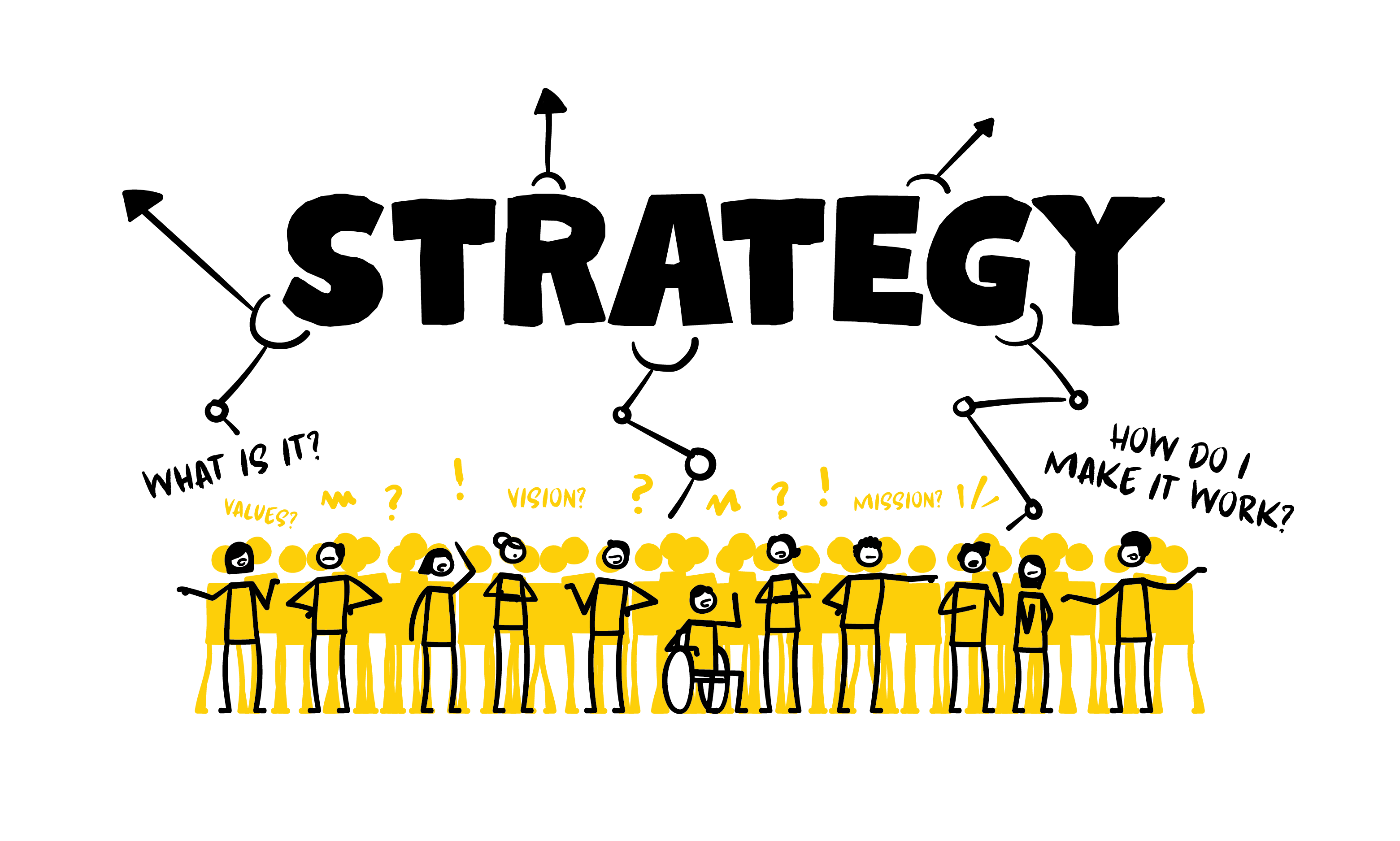If we want to provide a complete description of the strategy, we must first introduce its concept. Strategy, in its broadest sense, is the means by which people or organizations achieve their goals. Many books and articles in this field offer different definitions of the word strategy. The common denominator of all strategy descriptions is that the strategy focuses on achieving specific goals and involves allocating resources. In addition, the strategy shows several consistent, correct or coherent decisions or actions that indicate our path to success.
Strategy planning and implementation is an enormous task of an organization. At the time of life and death, along the path of survival or extinction, strategy accompanies the organization, and top managers can not ignore its study. It should be remembered that to achieve a great goal, you need an intelligent strategy to compete in the market and be ahead of your competitors.
However, as we mentioned, the concept and the reasons to use strategy have changed over the last half-century. With the increasing instability and unpredictability of the business environment, strategy has become less associated with detailed plans and programs and more concerned with guidelines for success. It seems that although successful people may not have a clear strategic plan, they have clear ideas about what they want and how to achieve it.
Shifting from strategy as a plan to strategy as a direction does not mean the thriving of strategy role. The more turbulent the environment, the more flexible and responsive the strategy should be. In this circumstance, strategy becomes even more important than ever. When firms face unforeseen threats, and new opportunities are constantly emerging, the strategy becomes a compass that can steer the firm through stormy seas.
Strategy Emergence History
Organizations need business strategies as much as armies need military strategies to direct their work, use resources more effectively, and coordinate decisions made by different individuals. Many concepts and theories about business strategy are rooted in military strategy. Strategy ideas are shaped by military struggles to defeat the enemy. They also used it to defeat someone who has lined up to fight on the opposite front.
But where did the word strategy come from? In fact, the word is derived from the Greek word strategia, meaning “military management”. But the concept of strategy did not originate in Greece: the classic work of San Tezu (Art of War) around 500 BC is known as the first description and the first definition of strategy.
Learn more: Strategic Marketing Planning and How to Formulate It
Military Strategy Vs. Business Strategy
Military strategy and business strategy have common concepts and principles, the main of which is about the difference between strategy and tactics.
Strategy is the blueprint for using resources to create the desired situation. On the other hand, a tactic is a plan for a specific action. While tactics involve manoeuvres to win battles, strategy discusses winning battles. Strategic decisions and the way strategic decisions are made (both in the military and in the business environment) are common features of both perspectives, each of which has three characteristics in common:
- Are important
- They require significant resource allocation
- They are not simply reversible
Many principles of military strategy have been applied in business situations and have been very successful in determining the winner of the competition. These principles include:
- The relative strengths of offensive and defensive strategies
- Criteria for overtaking in the face of aggression
- The role of graded reactions to aggression;
- The benefits of surprise
- And the potential to deceive, encircle the enemy, increase the extent of war, and erode forces.
At the same time, there are important differences between trade competition and military conflict. The goal of war is (usually) to defeat the enemy. However, the goal of business competition is not too aggressive: Most business organizations limit their competitive ambitions and seek coexistence instead of destroying competitors.
It is important to know that strategy can help you understand what strategic management is for. This will help you to direct your thoughts and determine the right path.
Learn more: 7 Tips in Startup Management That Will Save You!

The Precise Definition of Strategy in Business Management
There is no general and comprehensive understanding between experts. Different experts use the word strategy in different ways. The following is an attempt to express popular views about the meaning of this word:
Chandler defines strategy as follows: The strategy is to determine the basic and long-term goals of an organization and to select the actions and allocate the necessary resources to achieve these goals.
Pearce and Robinson define strategy as the following: The strategy is large-scale, forward-looking programs to interact with the competitive environment in order to optimize the achievement of the organization’s goals. In other words, strategy is the organization’s game plan, which, although not determines all human, financial and material needs in the future; still, it provides a framework for decision-making and demonstrates the company’s awareness of how to compete against whom, when, where and for what.
In general terms, strategy is a plan and vision of future goals that an entity formulates and pursues in order to achieve its goals. But in management science, strategy formulation is one of the serious management tasks that are the basis of critical decisions of managers to maintain the survival of the organization and its activities.
The business strategy focuses on improving the competitive position and tries to make the products of the business unit (goods or services in an industry with a specific market segment) their desired position. Business strategy shows how an organization should compete in a particular industry. There are different frameworks for strategic business analysis, but common typologies for business strategies are:
- Miles & Snow typology that focuses on the rate of desire to change the product – the market.
- Porter typology that focuses on customers and competitors
Four Types of Business Strategies Based on Miles and Oslo Typology
According to the findings of Miles and Snow, two great business strategists, organizations mainly use one of four types of adaptive strategies:
- Invaders (explorers)
- Analysts
- Passive
- Defenders
Offensive Strategy
Organizations that choose an aggressive (exploratory) strategy are very innovative. They are always looking for new markets and new opportunities for further growth. Such organizations are constantly looking to develop new and creative products and ideas and have a wide range of products and markets.
Defensive Strategy
Organizations that choose a defensive strategy strive to find and maintain a secure position in stable areas of service or product. Such organizations offer a relatively limited range of products compared to competitors and try to maintain their superiority by emphasizing efficient production and customer satisfaction. These organizations usually do not take the lead in developing and designing new products.
Analyst Strategy
Organizations that choose analytics strategies make fewer and slower changes to the product and market than aggressive strategies. But they have less commitment to stability and market share than defenders. These organizations first analyze the various situations, then take appropriate action. Therefore, they may act a little later than those who have chosen the offensive strategy.
Passive Strategy
Organizations that choose a passive strategy do not have a defined and specific competitive strategy. Unlike their competitors, these organizations do not have a fixed product and market policy. They do not like to take risks in designing and developing new products or new markets. They react when exposed to environmental pressures. In fact, these organizations always create a strong barrier to change and try not to accept current issues.
The Role of Strategy in Business Success
If you look at the biographies of very successful people and monitor their performance, you will find significant points that are common to all of them. If we look at the world’s political leaders, the CEOs of the world’s top 500 companies, or your circle of friends and acquaintances, those who have achieved tremendous success in their careers seldom have amazing innate abilities. They are the ones who have followed their career path effectively and with an effective strategy.
An effective strategy usually involves four factors:

Four Factors in Developing a Good Strategy
Various studies show that four common factors play a significant role in developing a successful strategy:
- Consistent and long-term goals:
Successful people have a long-term commitment to professional goals that they have consistently pursued and strived to achieve.
- Deep understanding of the competitive environment:
Following the professional path of successful people shows a deep and conscious understanding of the external environments. The better a business can analyze its environment, the more it can determine the right path over its competitors.
- Objective evaluation of resources:
People who achieve great success have the skills to identify and use the resources at their disposal. They knew what they were most talented at and always tried to develop their innate talents. Different businesses and organizations must also properly identify their competencies and capabilities and strive for the growth and prosperity of these resources.
- Effective Implementation:
Without effective implementation, even the best strategies will not be of the least benefit to businesses.
The role of strategy in success can be seen in most areas of human and organizational endeavours. If we look at war, chess, politics, sports, or business, the success of individuals and organizations has rarely been the result of a completely random process. Excellence in the gift of skills and resources is not usually the determining factor. Strategies based on these four elements almost always play an important role and can lead the future of individuals, businesses and organizations to growth and excellence.


Thank you for your sharing. I am worried that I lack creative ideas. It is your article that makes me full of hope. Thank you. But, I have a question, can you help me?